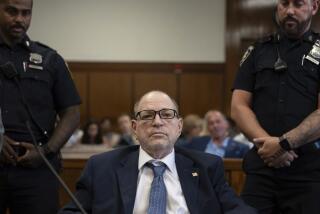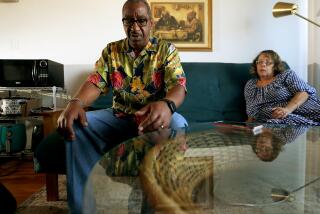Court Bolsters Demand for Release
- Share via
The U.S. 9th Circuit Court of Appeals directed a federal judge Friday to examine whether several California law enforcement officials should be held in contempt of court for “deliberately failing to comply” with an order to release a man who was convicted of murder 24 years ago on the word of an unreliable jailhouse informant.
On Dec. 4, a three-judge panel of the appeals court ordered the state to release Thomas Lee Goldstein without bail after finding that prosecutors had denied him a fair trial.
But instead of releasing Goldstein, who turns 55 today, G.E. Harris, warden of the state prison at Coalinga, turned him over to Los Angeles County sheriffs. They transported him to a county jail, where he has remained behind bars.
In their order Friday, the 9th Circuit judges repeated their original order, putting in capital letters their directive for Goldstein’s “IMMEDIATE RELEASE FROM CUSTODY.”
The federal judges found several serious problems with Goldstein’s original trial. The chief one was prosecutors’ use of an informant, Edward F. Fink. Over a period of 10 years, Fink testified in at least 10 cases that people had confessed crimes to him while they shared his jail cell.
At Goldstein’s trial in 1980, Fink testified that Goldstein had confessed murder to him when they shared a cell at the Long Beach city jail. Asked if he had received any benefit from authorities for his testimony, Fink said no.
In fact, federal judges have ruled, the evidence suggests that Fink and authorities had reached a deal for Fink to get a lighter sentence in exchange for his testimony.
Prosecutors’ failure to tell defense lawyers about the deal violated Goldstein’s constitutional rights, the judges said when they ordered Goldstein’s release without bail.
In mid-December, when he learned that Goldstein was still in custody, Deputy Federal Public Defender Sean K. Kennedy, one of his lawyers, asked that state officials be held in contempt.
In response, Deputy Atty. Gen. William H. Davis Jr. sent a letter to the court. The letter said that Los Angeles County prosecutors intended to retry Goldstein.
They were concerned, it said, that “if Mr. Goldstein were released, he would seek to avoid further proceedings and leave the state’s jurisdiction.”
The Los Angeles district attorney’s office had issued a detainer order to state prison officials, and it was “a lawful state order” that provided the basis for keeping Goldstein in custody, the letter said.
The detainer order, Davis wrote, was “independent state action which is consistent with, and in conformance with,” the 9th Circuit’s order “permitting the retrial of Goldstein.”
In a statement Friday, Sandi Gibbons, spokeswoman for the Los Angeles district attorney’s office, repeated that assertion, saying that Goldstein had been properly detained and that police and prosecutors were holding him pending a new trial.
After the 9th Circuit’s original order, prosecutors “made a preliminary decision to retry the case on the basis that the evidence in support of the original conviction of first-degree murder is strong,” Gibbons said. “A reinvestigation began immediately, involving both this office and the Long Beach Police Department.”
Goldstein “remains in state custody without bail, and a hearing on the case is scheduled for Monday in Long Beach Superior Court,” Gibbons said.
“The prosecutor assigned to this case and Long Beach Police detectives are working diligently to reconstruct this 24-year-old murder case.”
The 9th Circuit judges did not directly address the arguments for keeping Goldstein in custody, but their action Friday indicates that they did not agree with the state’s claims.
The appeals court told District Judge Dickran M. Tevrizian to hold a hearing to determine whether “together or individually or with others as yet unknown,” Harris, the state attorney general’s office, local prosecutors or prison officials had deliberately failed to comply with the court order and if so, “what sanctions might be appropriate under the circumstances.”
Kennedy, who has expressed dismay for weeks that Goldstein had not been released, said he was pleased with the court order.
More to Read
Sign up for Essential California
The most important California stories and recommendations in your inbox every morning.
You may occasionally receive promotional content from the Los Angeles Times.










